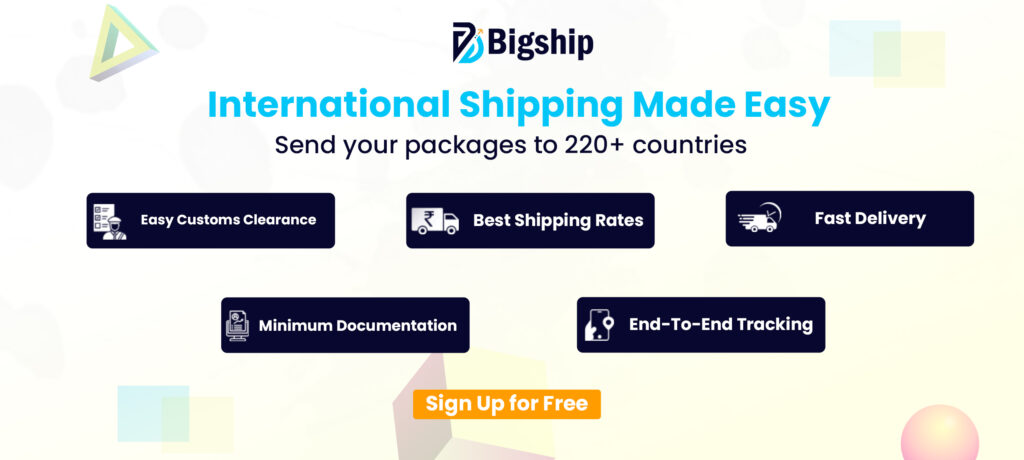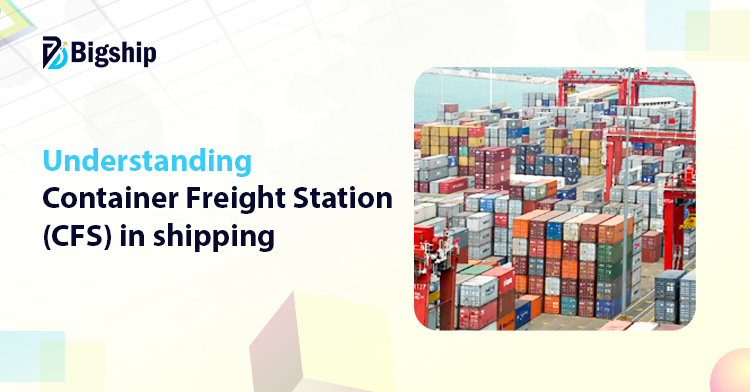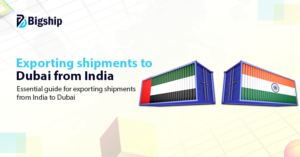Shipping goods across borders involves many steps, and one important link in that chain is the Container Freight Station or CFS. It is a place where cargo is received, checked, packed, or unpacked before reaching the port or after arriving from one. You can call it the heart of CFS in logistics, keeping goods organized and ready for movement.

In this blog, you will see what is CFS in shipping, how it works, and why it matters in global trade today.
What is CFS in shipping?
A Container Freight Station is a place where goods are collected, sorted, and prepared for shipping. It is like a middle point between the shipper and the port. In simple terms, CFS in logistics helps manage both LCL and FCL cargo, particularly the LCL.
Here, usually smaller shipments from different exporters are brought together and packed into one container before being sent to the port. At the destination, the same process happens in reverse, that is, the goods are unpacked and sent to their final locations. This setup makes CFS an important part of smooth cargo movement in global trade.
How does a Container Freight Station work?
A Container Freight Station (CFS) plays a key role in logistics by being a link between the shipper, the port, and the consignee. The whole CFS shipping process happens through simple steps. Here’s how it works:
Cargo Arrival: Goods reach the container freight station from different suppliers or exporters.
Checking and Documentation: Each shipment is then verified with papers like invoices and cargo lists to ensure details match.
Consolidation: For export, smaller shipments going to the same destination are combined into one container.
Stuffing: The grouped cargo is carefully packed into the container to save space and protect goods.
De-stuffing: At the destination CFS, containers are opened, and cargo is separated for each consignee.
Customs Inspection: Customs officers may inspect goods at the CFS before clearance.
Delivery: After inspection and clearance, shipments are sent for final delivery.
Importance of CFS in shipping
Here’s why a Container Freight Station (CFS) holds great importance in logistics and shipping:
Efficient Cargo Handling: CFS makes loading and unloading faster and safer. It reduces delays and avoids cargo mix-ups.
Simplified Customs Process: Customs checking becomes easier since officers can inspect goods directly at the CFS.
Support for LCL Shipments: CFS logistics is ideal for businesses that do not ship full containers, helping them ship smaller loads easily.
Reduced Port Congestion: Cargo handling at CFS reduces the crowd at ports and keeps operations organized.
Types of Container Freight Stations
There are mainly two types of Container Freight Stations used in logistics. Each one plays a different role in the shipping process.
Origin CFS: This station is in the country where goods start their journey. Here, small shipments from different exporters are brought together and packed into one container before export. It’s the place where cargo gets ready for international movement.
Destination CFS: This station is in the country where the goods arrive. The containers are opened here, and each shipment is separated for its buyer. It helps importers receive their goods quickly and keeps CFS shipping organized at the destination.
What are CFS charges and how are they calculated?
CFS charges are the fees you pay for services at a Container Freight Station. These services include loading, unloading, storage, and handling of cargo inside the warehouse. In simple terms, it’s the cost of taking care of your shipment while it’s at the CFS.
Here’s how the charges are usually calculated:
- Weight or Volume: The most common way is by measuring how heavy or large your shipment is.
- Type of Cargo: Fragile, bulky, or special cargo may cost more because it needs extra care.
- Storage Time: The longer your goods stay at the CFS, the higher the charge.
- Value-Added Services: If you need repacking, labeling, or palletizing, those add to the bill.
Benefits of CFS for export and e-commerce businesses
A Container Freight Station (CFS) brings many benefits for exporters and e-commerce sellers who deal with global shipping. Here are some key benefits:
- CFS allows small exporters and online sellers to share container space. This reduces the cost per shipment, which is a big advantage for small businesses.
- All packing, loading, and customs activities happen in one place, which saves time and reduces confusion.
- Goods are kept in secure areas with proper checks. It lowers the risk of theft or damage during transit.
- Sellers who ship smaller parcels often use CFS logistics to send products overseas at lower costs.
- The process of CFS shipping keeps exporters, freight forwarders, and customs officers connected in one system.
Simplify e-commerce exports with Bigship
You can manage your e-commerce exports easily with Bigship. It connects you with trusted courier partners who handle international deliveries through CFS shipping systems. You get transparent pricing, faster pickups, and complete tracking. Small or large parcels, everything moves safely from your warehouse to the buyer’s doorstep. Bigship simplifies cross-border shipping so you can focus on growing your online business while it takes care of the shipping part with efficiency and trust.
Key Takeaways
- A Container Freight Station (CFS) acts as a link between the shipper, the port, and the consignee.
- CFS in logistics mainly handles cargo that doesn’t fill a full container, that is, LCL shipments.
- It reduces port congestion and improves cargo safety.
- CFS supports exporters, importers, and e-commerce sellers by keeping trade efficient and organized.
- It manages receiving, checking, packing, and unpacking of goods at one place.
Conclusion
A Container Freight Station plays a big role in keeping trade organized and goods safe during transit. It supports exporters, importers, and e-commerce sellers by handling every step with care, from receiving to delivery. The process of CFS shipping saves time, space, and cost for businesses of all sizes. In simple words, CFS acts as the bridge that connects warehouses to the world. Without it, international trade would be slower and far more complicated.
Sign up with Bigship and get access to courier partners that make exports smooth.
FAQs
What is a Container Freight Station (CFS)?
A CFS is a facility where goods are packed, unpacked, and stored before or after they are shipped through a port.
How does CFS shipping help small businesses?
It allows small exporters to share container space and reduce shipping costs.
What is the difference between Origin CFS and Destination CFS?
Origin CFS handles cargo before export, while Destination CFS manages goods after import.





